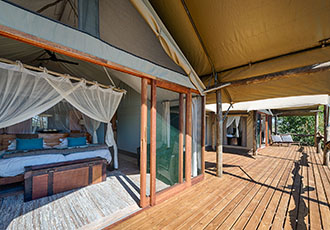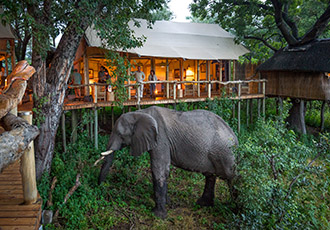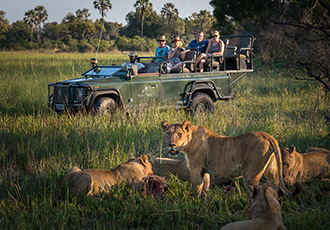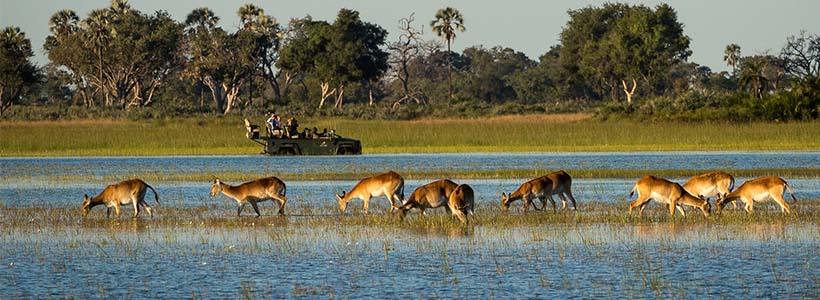Xuagana Island Lodge
Widely recognised as the most spectacular permanent water site in the entire Okavango Delta ...

Tubu Tree set in the trees over looking a flood plain
Hunda Island in the Okavango Delta, on which Tubu Tree is situated, is known for its concentrations of game and offers both spectacular wildlife viewing on land, and tranquil adventures on the water. This combination of activities makes time spent at Tubu Tree a complete Delta adventure.Tubu Tree lies on the western side of isolated Hunda Island, with easy access to diverse habitats and thus excellent game viewing.
Located in the Okavango Delta Tubu Tree, as its name indicates, is built into the trees, with elevated wooden walkways connecting eight traditional-style tents on raised platforms, with picturesque views over the surrounding floodplains from a private deck.
Wildlife seen around Tubu Tree includes elephant, lion, Burchell's zebra, red lechwe, southern giraffe, tsessebe, and blue wildebeest on the floodplains. Kudu, impala, bushbuck and leopard are also seen in the forested areas. The variety of birdlife is impressive, with dry-land species seen on the larger islands and a multitude of wetland birds seen on the floodplains and waterways.
The Jao Concession in the Delta is 60 000 hectares (150 000 acres) in extent and lies in the north-western area of the Okavango Delta, situated below the Okavango Panhandle. The Moremi Game Reserve forms the eastern boundary of the Concession. Situated in the very heart of the wetlands of the Okavango Delta, the Jao Concession embodies all the magic and mystique of Botswana with vegetation that varies from permanent swamps to dry land. In the east, the Jao Flats boast water channels that cut their way through the papyrus and reed beds, providing the perfect environment for wildlife.
Beautiful lush palm islands dot the water. Further west, the area gets progressively dryer and Hunda Island, which is the tip of a large 'sand tongue,' is the largest area of dry land in the Jao Concession during the inundation (July-Sept). Hunda Island has sandveld vegetation supporting many species of nutritious acacia and grewia shrubs which in turn provide excellent browsing.
Around the Jao Flats, spectacular herds of red lechwe are followed by their predators – lion and leopard. Hippo and Nile crocodile are regularly sighted. Other game includes blue wildebeest, impala, tsessebe, southern giraffe, elephant, hippo and crocodile, spotted-necked otter and even the occasional sitatunga. The drier west harbours similar species, with greater concentrations of Burchell’s zebra and blue wildebeest.
Birding is exceptional in the Jao Concession: Vulnerable wattled crane, slaty egret, rosy-throated longclaw, Pel’s fishing-owl, and lesser jacana are found on the eastern side, with the western drier areas hosting crimson-breasted shrike, Dickinson’s kestrel and Meyer’s parrot. Other exceptional species often recorded at Jao include swamp nightjar and brown firefinch.
As its name indicates, this eight-tented traditional-style camp is set in the tree canopy on raised decks, with a view of the open, grassy floodplain in front.


This camp can accommodate 16 guests and 2 children in the 9 units.
Each tent has an en-suite bathroom and an outdoor shower, while the family unit consists of two adjoining tents with separate bathrooms and a shared lounge. The main dining and lounge areas and pool are raised to maximise the vista across the floodplains, and an open bar area is shaded by a large marula tree. A Star Bed for sleep-outs is located 20 minutes from camp.
Eight Standard tented rooms consisting of 7 x twin bedded tents, 1 x honeymoon tent with king-size bed, 1 x family unit The family unit consists of two adjoining tents with separate bathrooms and a shared lounge.

Tubu Tree Family unit - luxury deep in the Delta
Tubu Treeunique points...


Tubu Tree offers a truly authentic water and land safari experience.
Game drives are planned for mornings and evenings as this is the time when the animals are most active. The game drives last for about three hours and include a coffee stop for the morning drive and a sun-downer stop in the evening.Tubu Tree generally adjusts the activity times accordingly to the seasons in order to maximise game-viewing opportunities and ensure that guests enjoy a comfortable experience.There are also all the other activities to enjoy so the daily activities are flexible - this is just a guide line


Tubu Tree is intimately involved in projects that support sustainable conservation and community upliftment including assisting the local school with many of its requirements.
Tubu Joint Management Committee, Jao Concession and the University of Botswana (under the auspices of the Biokavango Project) formed a committee to encourage better engagement between local communities and the Jao Concession, specifically regarding curbing poaching and over-fishing.
War on Plastic In 2012, we developed a strategy to reduce the use of bottled water across all our operations. Through the use of reusable bottles for guests and installing on-site water purification systems at our camps, we have been able to reduce our plastic water bottle usage by 75%.
Going Green This camp is powered by a hybrid system, combining a diesel-powered generator that charges a bank of batteries, which in turn supplies the camp with electricity through an inverter. Thanks to this system, the generator only needs to operate for eight hours a day as opposed to 24 hours. Waste water (sewage and grey water) is treated in an Above Ground Sewage Plant, ensuring that the water is clean before being allowed to enter the natural environment. In order to reduce our use of bottled water, reverse osmosis filtration is done on site to provide guests with high-quality drinking water. Like all Wilderness camps, this camp is managed and monitored against very strict in-house environmental standards, so only approved eco-friendly detergents and chemicals are used.

Game drive from Tubu Tree
This is a Malaria area.
Allow our experience to work for you
Widely recognised as the most spectacular permanent water site in the entire Okavango Delta ...
The renowned and totally brand new Duba Plains Camp sits in the heart of the Okavango Delta...
Located in the Moremi Game Reserve which is situated in the eastern part of the Okavango Delta...